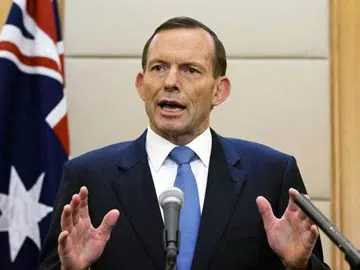
File photo of Australian Prime Minister Tony Abbott. (AP)
Canberra:
Australian military aircraft will fly guns and ammunition into Iraq to help fight Islamic State militants, Australia's prime minister said on Sunday.
"The United States government has requested that Australia help to transport stores of military equipment, including arms and munitions, as part of a multi-nation effort," Prime Minister Tony Abbott said in a statement.
"Royal Australian Air Force C-130 Hercules and C-17 Globemaster aircraft will join aircraft from other nations including Canada, Italy, France, the United Kingdom and the United States to conduct this important task," Abbott added.
He did not say when the air drops would begin, but News Corp. newspaper reported in Sunday that the transport aircraft based at al-Minhad Air Base outside Dubai could fly their first mission within days.
Australian C-130s had previously made humanitarian air drops including food and water to thousands of people stranded by fighting on Mount Sinjar in northern Iraq.
"Australia's contribution will continue to be coordinated with the government of Iraq and regional countries," Abbott said.
"The situation in Iraq represents a humanitarian catastrophe," he said.
"Australia remains in close contact with the United States and other international partners and we will continue to work to alleviate the humanitarian situation in Iraq and address the security threat posed by ISIL," he added, referring to the al-Qaida splinter group leading Sunni militants in Iraq, Islamic State of Iraq and the Levant, which now calls itself simply Islamic State.
The Australian government has said it is open to the prospect of launching air strikes against Islamic State militant targets, subject to invitations from the U.S. and Iraq governments.
Australia estimates 60 of its citizens are fighting for the Islamic State group and another al-Qaida offshoot Jabhat al-Nursa, also known as the Nusra Front in Iraq and Syria. Another 15 Australian fighters had been killed, including two young suicide bombers.
The government warns that the Islamic State movement poses and unprecedented domestic terrorism threat. Australia has proposed tough new counterterrorism laws and announced 630 million Australian dollars ($590 million) in new spending on intelligence, law enforcement and border protection agencies over the next four years to enhance security, including a roll out of biometric screening at airports.
Britain on Friday raised its terror threat level to severe, the second-highest level. But Australia announced on Saturday that its threat level remained at medium, a level that had not changed in more than a decade.
The chief of Australia's secret service David Irvine, director-general of the Australian Security Intelligence Organization, said last week that the nation's threat level would be reassessed if Australia took a combat role in Iraq or Syria.
"The United States government has requested that Australia help to transport stores of military equipment, including arms and munitions, as part of a multi-nation effort," Prime Minister Tony Abbott said in a statement.
"Royal Australian Air Force C-130 Hercules and C-17 Globemaster aircraft will join aircraft from other nations including Canada, Italy, France, the United Kingdom and the United States to conduct this important task," Abbott added.
He did not say when the air drops would begin, but News Corp. newspaper reported in Sunday that the transport aircraft based at al-Minhad Air Base outside Dubai could fly their first mission within days.
Australian C-130s had previously made humanitarian air drops including food and water to thousands of people stranded by fighting on Mount Sinjar in northern Iraq.
"Australia's contribution will continue to be coordinated with the government of Iraq and regional countries," Abbott said.
"The situation in Iraq represents a humanitarian catastrophe," he said.
"Australia remains in close contact with the United States and other international partners and we will continue to work to alleviate the humanitarian situation in Iraq and address the security threat posed by ISIL," he added, referring to the al-Qaida splinter group leading Sunni militants in Iraq, Islamic State of Iraq and the Levant, which now calls itself simply Islamic State.
The Australian government has said it is open to the prospect of launching air strikes against Islamic State militant targets, subject to invitations from the U.S. and Iraq governments.
Australia estimates 60 of its citizens are fighting for the Islamic State group and another al-Qaida offshoot Jabhat al-Nursa, also known as the Nusra Front in Iraq and Syria. Another 15 Australian fighters had been killed, including two young suicide bombers.
The government warns that the Islamic State movement poses and unprecedented domestic terrorism threat. Australia has proposed tough new counterterrorism laws and announced 630 million Australian dollars ($590 million) in new spending on intelligence, law enforcement and border protection agencies over the next four years to enhance security, including a roll out of biometric screening at airports.
Britain on Friday raised its terror threat level to severe, the second-highest level. But Australia announced on Saturday that its threat level remained at medium, a level that had not changed in more than a decade.
The chief of Australia's secret service David Irvine, director-general of the Australian Security Intelligence Organization, said last week that the nation's threat level would be reassessed if Australia took a combat role in Iraq or Syria.
Track Latest News Live on NDTV.com and get news updates from India and around the world

